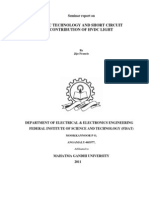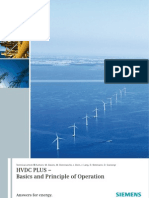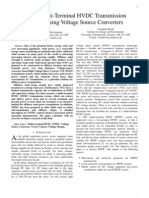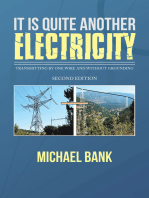Professional Documents
Culture Documents
HVDC
HVDC
Uploaded by
D SadikOriginal Description:
Original Title
Copyright
Available Formats
Share this document
Did you find this document useful?
Is this content inappropriate?
Report this DocumentCopyright:
Available Formats
HVDC
HVDC
Uploaded by
D SadikCopyright:
Available Formats
B V RAJU INSTITUTE OF TECHNOLOGY
VISHNUPUR, NARSAPUR, MEDAK, TS – 502313
UGC-AUTONOMOUS
DEPARTMENT OF ELECTRICAL AND ELECTRONICS ENGINEERING
SEMINAR ABSTRACT SUBMISSION
Roll No: 19211A0230 Name of the Student: DUDEKULA SADIK
TITLE: HVDC (High-voltage Direct Current) TRANSMISSION SYSTEM
1. OBJECTIVES/SCOPE: Please list the objectives and scope of the proposed topic. (25-‐75 words)
OBJECTIVES: long distance power transmission, minimizing power losses, Control of power flow, power transfer
between asynchronous grids and reduced environmental impact.
SCOPE: The main scope of HVDC transmission system is to transmit electric power over long distance with low
losses, improved power quality than AC transmission systems.
2. METHODS PROCEDURES, PROCESS: Briefly explain your overall approach, including your methods,
procedures and process. (75-‐100 words)
This approach of HVDC transmission system is to convert AC electricity generated at power plants into DC
electricity, transmit it over long distance through high voltage transmission lines and then convert it back into AC
electricity for distribution to end-users. There are two main methods involved in the transmission are Line
Cumulated Converter and Voltage Source Converter. The Process involves the conversion of AC/DC at DC
converter station and at receiving end.
3. RESULTS, OBSERVATIONS, CONCLUSIONS: Please describe the results, observations and conclusions
of the proposed seminar topic. (100-‐200 words)
High Voltage Direct Current transmission systems are used to transmit electrical power over long distances with
minimal power loss. Results and observations of HVDC systems include The HVDC systems have a higher
transmission efficiency compared to AC transmission system, and these systems offer improved power quality by
reducing the impact of harmonics and other power quality issues that can arise in AC systems’ systems are often
used to interconnect different AC power grids, making it possible to transmit power between regions’ systems can
be more cost effective than AC systems for long distance transmission, as they require fewer transmission lines and
substations and also they have a smaller environmental impact compared to AC systems, as they require fewer
transmission lines and have a smaller footprint. The use of HVDC systems is likely to increase in the future as the
demand for reliable and efficient power transmission solutions grows, making it an important area of study for
engineers in the electrical power industry.
4. Please explain how this seminar will present novel (new) or additive information to the existing that
can be of benefit to a practicing engineer. (25-‐75 words)
HVDC systems offer several benefits over AC systems, which can be of value to a practicing engineer. The
benefits can provide novel or additive information to a practicing engineer, helping them make informed decisions
on power transmission and distribution projects.
SIGNATURE OF
STUDENT GUIDE SEMINAR SUPERVISOR HEAD OF THE DEPARTMENT
You might also like
- Nitish Kumar FinalDocument26 pagesNitish Kumar Finalsunil kumarNo ratings yet
- Summary of Electric Transmission Assessment Report: January 2010Document10 pagesSummary of Electric Transmission Assessment Report: January 2010Anvar Ali KNo ratings yet
- Efficient Ways of Transmitting PowerDocument9 pagesEfficient Ways of Transmitting Powergillanis multimediaNo ratings yet
- High Voltage Direct Current Transmission: A Training Report OnDocument43 pagesHigh Voltage Direct Current Transmission: A Training Report OnSaurabh AnandNo ratings yet
- Advantages of HVDC Over HVAC Transmission - EEPDocument5 pagesAdvantages of HVDC Over HVAC Transmission - EEPBattinapati ShivaNo ratings yet
- Aryanppt-Hvdc SysDocument17 pagesAryanppt-Hvdc SysRaj DeepNo ratings yet
- Seminar - HVDC Technology and Short Circuit Contribution of HVDC LightDocument36 pagesSeminar - HVDC Technology and Short Circuit Contribution of HVDC LightJijo Francis100% (3)
- Analysis and Control of HVDC Transmission Power System: December 2016Document10 pagesAnalysis and Control of HVDC Transmission Power System: December 2016AbhiNo ratings yet
- HVDC Plus Basic and PrincipalsDocument24 pagesHVDC Plus Basic and Principalstkdrt2166No ratings yet
- Performance Analysis of A High Voltage DC (HVDC) Transmission System Under Steady State and Faulted ConditionsDocument8 pagesPerformance Analysis of A High Voltage DC (HVDC) Transmission System Under Steady State and Faulted ConditionsrichatNo ratings yet
- AC20Grid20with20Embedded20VSC HVDC20Energy2030 - 1069 1Document8 pagesAC20Grid20with20Embedded20VSC HVDC20Energy2030 - 1069 1nn1601832No ratings yet
- Multilevel LVDC Distribution System With Voltage Unbalancing and Disturbance Rejection Control TopologyDocument15 pagesMultilevel LVDC Distribution System With Voltage Unbalancing and Disturbance Rejection Control TopologyNexgen TechnologyNo ratings yet
- 2019 Evaluation of Distance Protection Responses in AC Power System With Converter InterfaceDocument6 pages2019 Evaluation of Distance Protection Responses in AC Power System With Converter InterfaceAbhishekAnandNo ratings yet
- Iare - HVDC - Lecture Notes PDFDocument57 pagesIare - HVDC - Lecture Notes PDFShakeeb ArefinNo ratings yet
- HVDC Transmission Part 1 TechnologyDocument6 pagesHVDC Transmission Part 1 TechnologyDavid PhillipsNo ratings yet
- 9 1526549792 - 17-05-2018 PDFDocument6 pages9 1526549792 - 17-05-2018 PDFAnonymous lPvvgiQjRNo ratings yet
- HVDC Thesis 2014Document4 pagesHVDC Thesis 2014gracieseguracorpuschristi100% (1)
- HVDC TechnologyDocument48 pagesHVDC TechnologyIsrajuddinNo ratings yet
- Comparative Study of HVDC and HVAC For A Bulk Power TransmissionDocument6 pagesComparative Study of HVDC and HVAC For A Bulk Power TransmissionNidhiNo ratings yet
- IJETR022506Document5 pagesIJETR022506erpublicationNo ratings yet
- Modeling of Three-Winding Transformers PDFDocument20 pagesModeling of Three-Winding Transformers PDFGhislainNo ratings yet
- Analysis of Thyristor Based HVDC TransmiDocument10 pagesAnalysis of Thyristor Based HVDC TransmislOwpOke13No ratings yet
- Section B AbdurehmanDocument32 pagesSection B AbdurehmansyabseeshoesNo ratings yet
- 04 Power TransmissionDocument64 pages04 Power TransmissionRafael FurquimNo ratings yet
- Introduction To HVDC Architecture and Solutions For Control and ProtectionDocument20 pagesIntroduction To HVDC Architecture and Solutions For Control and Protectionnvenkatrao310No ratings yet
- HV AC and HV DCDocument17 pagesHV AC and HV DCChandra ShekharNo ratings yet
- Shubham SeminarDocument19 pagesShubham SeminarShubham BodadeNo ratings yet
- HVDC Plus Basics and PrincipleDocument24 pagesHVDC Plus Basics and PrincipleNtomboxolo BuzaniNo ratings yet
- Shubham SeminarDocument19 pagesShubham SeminarShubham BodadeNo ratings yet
- Design and Fault Analysis of EHV HVDC Transmission Line Using MATLAB SimulinkDocument19 pagesDesign and Fault Analysis of EHV HVDC Transmission Line Using MATLAB SimulinkShubham Bodade100% (1)
- Shubham SeminarDocument19 pagesShubham SeminarShubham BodadeNo ratings yet
- Facts and HVDC Light For Power System Interconnections Rolf Grünbaum, Bruno Halvarsson, Aleksander Wilk-Wilczynski ABB Power Systems AB, SwedenDocument18 pagesFacts and HVDC Light For Power System Interconnections Rolf Grünbaum, Bruno Halvarsson, Aleksander Wilk-Wilczynski ABB Power Systems AB, SwedenShipra DewanganNo ratings yet
- Techno Economic Analysis of HVDC Links For Inter State InterconnectionDocument8 pagesTechno Economic Analysis of HVDC Links For Inter State InterconnectionEditor IJTSRDNo ratings yet
- High Voltage Direct Current Transmission System HVDC SeminarDocument19 pagesHigh Voltage Direct Current Transmission System HVDC SeminarArushi Mohapatra100% (2)
- HVDC TransmissionDocument14 pagesHVDC TransmissionAxay ShahNo ratings yet
- Future Multi-Terminal HVDC Transmission Systems Using Voltage Source ConvertersDocument6 pagesFuture Multi-Terminal HVDC Transmission Systems Using Voltage Source ConvertersJackie ChuNo ratings yet
- Ehvac To HvacDocument5 pagesEhvac To HvacInsaf MohamedNo ratings yet
- HVDC Light TechnologyDocument6 pagesHVDC Light TechnologykanvarshNo ratings yet
- HVDC Unit-1Document18 pagesHVDC Unit-1samkousNo ratings yet
- Major ReportDocument43 pagesMajor ReportPrashant BaliaNo ratings yet
- Project Report (Submit)Document32 pagesProject Report (Submit)aakashNo ratings yet
- Unit-1-Basic Concepts Analysis of HVDC ConverterDocument23 pagesUnit-1-Basic Concepts Analysis of HVDC Converterravikumar_ranganNo ratings yet
- High Temperature Superconductors To DC Power Transmission & DistributionDocument3 pagesHigh Temperature Superconductors To DC Power Transmission & DistributionDarshan RaghuNo ratings yet
- Introduction To HVDC Architecture and Solutions For Control and ProtectionDocument18 pagesIntroduction To HVDC Architecture and Solutions For Control and ProtectionxsystemNo ratings yet
- Ravi HVDC Seminar ReportDocument22 pagesRavi HVDC Seminar ReportRavi Kiran0% (1)
- HVDC1Document62 pagesHVDC1n anushaNo ratings yet
- Energies 11 00367 v2Document15 pagesEnergies 11 00367 v2Paolo FlorentinNo ratings yet
- European Journal of Electrical Engineering: Received: 1 July 2020 Accepted: 12 November 2020Document14 pagesEuropean Journal of Electrical Engineering: Received: 1 July 2020 Accepted: 12 November 2020Dileep VarmaNo ratings yet
- Recent Advances in HVDC SystemsDocument4 pagesRecent Advances in HVDC SystemsvivekNo ratings yet
- 2014 P162Document16 pages2014 P162champion2007No ratings yet
- Advantages of HVDC Over HVAC Transmission: AC AsDocument3 pagesAdvantages of HVDC Over HVAC Transmission: AC AsYogendra SwarnkarNo ratings yet
- Multi-Objective Design Optimization For HVDC-LCC Converter Transformers Analytical and FEA-Based ComDocument14 pagesMulti-Objective Design Optimization For HVDC-LCC Converter Transformers Analytical and FEA-Based ComHarmonyNo ratings yet
- Challenges Faced in HVDC SystemsDocument12 pagesChallenges Faced in HVDC SystemsPKNo ratings yet
- Methods for Increasing the Quality and Reliability of Power System Using FACTS DevicesFrom EverandMethods for Increasing the Quality and Reliability of Power System Using FACTS DevicesNo ratings yet
- It Is Quite Another Electricity: Transmitting by One Wire and Without GroundingFrom EverandIt Is Quite Another Electricity: Transmitting by One Wire and Without GroundingNo ratings yet
- Distribution of Electrical Power: Lecture Notes of Distribution of Electrical Power CourseFrom EverandDistribution of Electrical Power: Lecture Notes of Distribution of Electrical Power CourseNo ratings yet
- Vosloo Comparison 2002Document273 pagesVosloo Comparison 2002Kamello AssisNo ratings yet
- LEak DetectorDocument2 pagesLEak Detectormec04162No ratings yet
- Chapter 25 - CapacitanceDocument12 pagesChapter 25 - CapacitanceVV CepheiNo ratings yet
- Haberleşme - Kenneth K.clarke Communication Circuit Analysis and Design Ders NotuDocument335 pagesHaberleşme - Kenneth K.clarke Communication Circuit Analysis and Design Ders NotuEEM Ders NotlarıNo ratings yet
- Hydrocity 01 InstructionsDocument2 pagesHydrocity 01 InstructionsBaselNo ratings yet
- 01 Vamp321Document12 pages01 Vamp321pemanr1914No ratings yet
- Forklift Truck Fuses: Special PurposeDocument4 pagesForklift Truck Fuses: Special PurposeassdaNo ratings yet
- Modification Sheet Yaesu FT-847: So This and All of My Modification Sheet Are For Education Purposes Only !Document28 pagesModification Sheet Yaesu FT-847: So This and All of My Modification Sheet Are For Education Purposes Only !Yudi WisenoNo ratings yet
- Engineering Practice Lab Manual Electrical and ElectronicsDocument55 pagesEngineering Practice Lab Manual Electrical and ElectronicsThanix SubramanianNo ratings yet
- Keysight 34401A Multimeter: Manual UpdatesDocument46 pagesKeysight 34401A Multimeter: Manual UpdatestomichelNo ratings yet
- Utilization of Metal Lathe Waste As Material For The Absorption of Electromagnetic Radiation Based OrgoniteDocument4 pagesUtilization of Metal Lathe Waste As Material For The Absorption of Electromagnetic Radiation Based OrgoniteStellaEstel100% (1)
- PDFDocument16 pagesPDFSorin MiuNo ratings yet
- 24 Electrical PowerDocument164 pages24 Electrical PowermarkNo ratings yet
- ATEX Du 496-185888Document14 pagesATEX Du 496-185888Bright OkunkpolorNo ratings yet
- KM3NET RAMS Analysis WRS SCB 20102017Document910 pagesKM3NET RAMS Analysis WRS SCB 20102017Ikhtiander IkhtianderNo ratings yet
- Ece221 Lab1Document11 pagesEce221 Lab1Lê Quốc DuyNo ratings yet
- Fundamentals of HarmonicsDocument127 pagesFundamentals of Harmonicsraghav4life8724No ratings yet
- AC Series Lift Control System: User ManualDocument62 pagesAC Series Lift Control System: User ManualCosmo MovieNo ratings yet
- Cross Bonding ENGDocument281 pagesCross Bonding ENGrrrrrrrrrrrrrrrrrrrrrrrrrrrrrrrrrrrrrrrrrNo ratings yet
- Service Manual: DSC-H20Document58 pagesService Manual: DSC-H20Toni011973No ratings yet
- Safety of Machinery - Electrical Equipment of Machines Part 1: General RequirementsDocument80 pagesSafety of Machinery - Electrical Equipment of Machines Part 1: General RequirementsBhavin DesaiNo ratings yet
- YAMAHA THR10 Loop Effect Modification PDFDocument6 pagesYAMAHA THR10 Loop Effect Modification PDFozzy123No ratings yet
- Experiment - Losses and Efficiency of AlternatorDocument8 pagesExperiment - Losses and Efficiency of AlternatorGurprit singhNo ratings yet
- Features & Specifications: Click Here For Acrylic Environmental Compatibility Table For Suitable UsesDocument2 pagesFeatures & Specifications: Click Here For Acrylic Environmental Compatibility Table For Suitable UsesJesus Molina YllaNo ratings yet
- Simrad p3007 Installation GuideDocument2 pagesSimrad p3007 Installation GuidePapa StasNo ratings yet
- PowerHour - NEC 2017 RequirementsDocument41 pagesPowerHour - NEC 2017 Requirementsgl1188No ratings yet
- Rom Transistors To Lasers and Light-Emitting Diodes: Nick Holonyak JRDocument7 pagesRom Transistors To Lasers and Light-Emitting Diodes: Nick Holonyak JRSantiago MoyaNo ratings yet
- Three Phase Inverter For Induction Motor by Using Pi-Repetitive Controller With ArduinoDocument44 pagesThree Phase Inverter For Induction Motor by Using Pi-Repetitive Controller With Arduinoملاك حمزهNo ratings yet
- Smart Bin: Project GuideDocument19 pagesSmart Bin: Project GuideShashwat SharmaNo ratings yet
- Omniksol-3k-5k Data Sheet enDocument2 pagesOmniksol-3k-5k Data Sheet enGurpreet Singh DhillonNo ratings yet

























































































